Opening remarks by Deputy President David Mabuza at the engagement with Traditional and Khoisan Leaders, Mangaung, Free State Province

Premier of the Free State Province, Ms Sisi Ntombela,
Morena e Moholo Moremoholo Mopeli,
Morena e Moholo Montoeli Mota,
Chairperson of the National House of Traditional and Khoisan Leaders, Nkosikazi Mhlauli, Ah! NoSandi!
Chairperson of the Provincial House of Traditional Leaders, Morena Neo Mopeli,
Marena le Mafumahadi,
Deputy Minister of Agriculture, Land Reform and Rural Development, Mr Mcebisi Skwatsha,
Deputy Minister of Co-operative Governance and Traditional Affairs, Mr Obed Bapela,
Members of the Provincial Executive Council,
Mayors present,
Senior Government Officials,
Ladies and Gentlemen,
We wish to take this opportunity to convey our sincere word of appreciation to you Premier Ntombela, for your warm words of welcome to this beautiful city of Mangaung, here in the Free State province.
Thank you for hosting this critical engagement with traditional leaders to deliberate on a range of issues affecting the standing and leadership role of traditional in development and service delivery. We also acknowledge your leadership role in fostering partnerships between the provincial government and traditional leadership institutions in the Province to ensure that the quality of lives of traditional communities are improved.
We thank all our revered traditional leaders for availing themselves to participate in today’s discussions. Traditional leaders are a vital cog in our democratic governance system across all spheres of government.
They remain central to the tasks of building safe and cohesive communities, and ensuring that our history, culture, languages, and heritage are celebrated and preserved for generations to come.
In the face of social ills confronting our communities, traditional leaders have an essential leadership role to play in working with government to deepen a culture of human rights for all. As leaders, you have a critical role to play in reversing the scourge of crime, gender-based violence and substance abuse within communities.
Working together with traditional leadership institutions, government is able to develop programmes that are responsive to challenges of unemployment, poverty and lack of key services in rural communities.
We must address underdevelopment and infrastructure deficits in rural communities. This requires deliberate and targeted investments in rural infrastructure networks to provide access to water and sanitation, electricity and roads that connect communities to workplaces, schools and health facilities.
It is common knowledge that traditional leaders have, over time, raised issues for consideration by government across a number of developmental aspects, including financial resources to build capacity of traditional leadership institutions and structures to execute their mandates. Some of the issues are currently being implemented by government, whereas others remain in the pipeline for resolution and action.
At the highest level of government, there is a commitment to act with a sense of urgency in resolving a number of issues that traditional leaders have raised. As part of this commitment, the President established the Inter-Ministerial Task Team chaired by the Deputy President to oversee government’s coordinated approach and response to issues affecting traditional leaders throughout the country.
The dialogue held with traditional leaders after the opening of the National House early this year laid an important foundation for our ongoing engagements with traditional leaders in all provinces.
Today’s reports and inputs will reflect on progress made on the composite list of priority issues that were raised with government. We will provide updates on progress made by various work streams established to pursue and resolve some of the sector-specific issues.
More importantly, we need to isolate some of the province-specific issues and map out a way to foster communication and collaboration between traditional leaders and government, including improved working relations between municipalities and institutions of traditional leadership at local levels.
Among many other issues, land reform remains a critical national intervention to reverse the legacy of land dispossession, and advance restorative justice. We are committed to working with traditional leaders to expand land access beyond what is currently available, and make sure that our land reform programmes achieve the desired transformative goals in an orderly and Constitutionally-defined manner.
Today’s engagement occurs just two months after we held the Summit on Communal Land Administration and Tenure Reform.
We will reflect on the broad outcomes of this Summit in terms of how it proposes some of the key actions around communal land administration and tenure reforms. Our task today is to make inputs and enrich reports so that lasting solutions are carefully crafted.
We are here to engage and take your views on board to shape the future development of our traditional communities. Traditional leaders must see themselves as agents of change.
We look forward to your active participation and engagement as we seek solutions to prevailing challenges that confront our rural communities.
I thank you.




